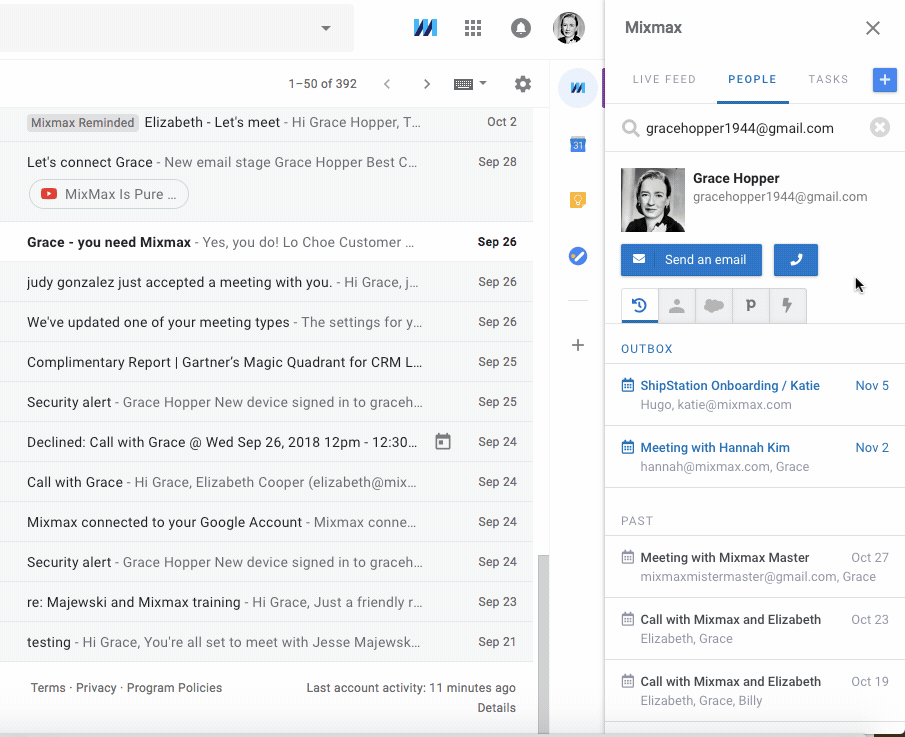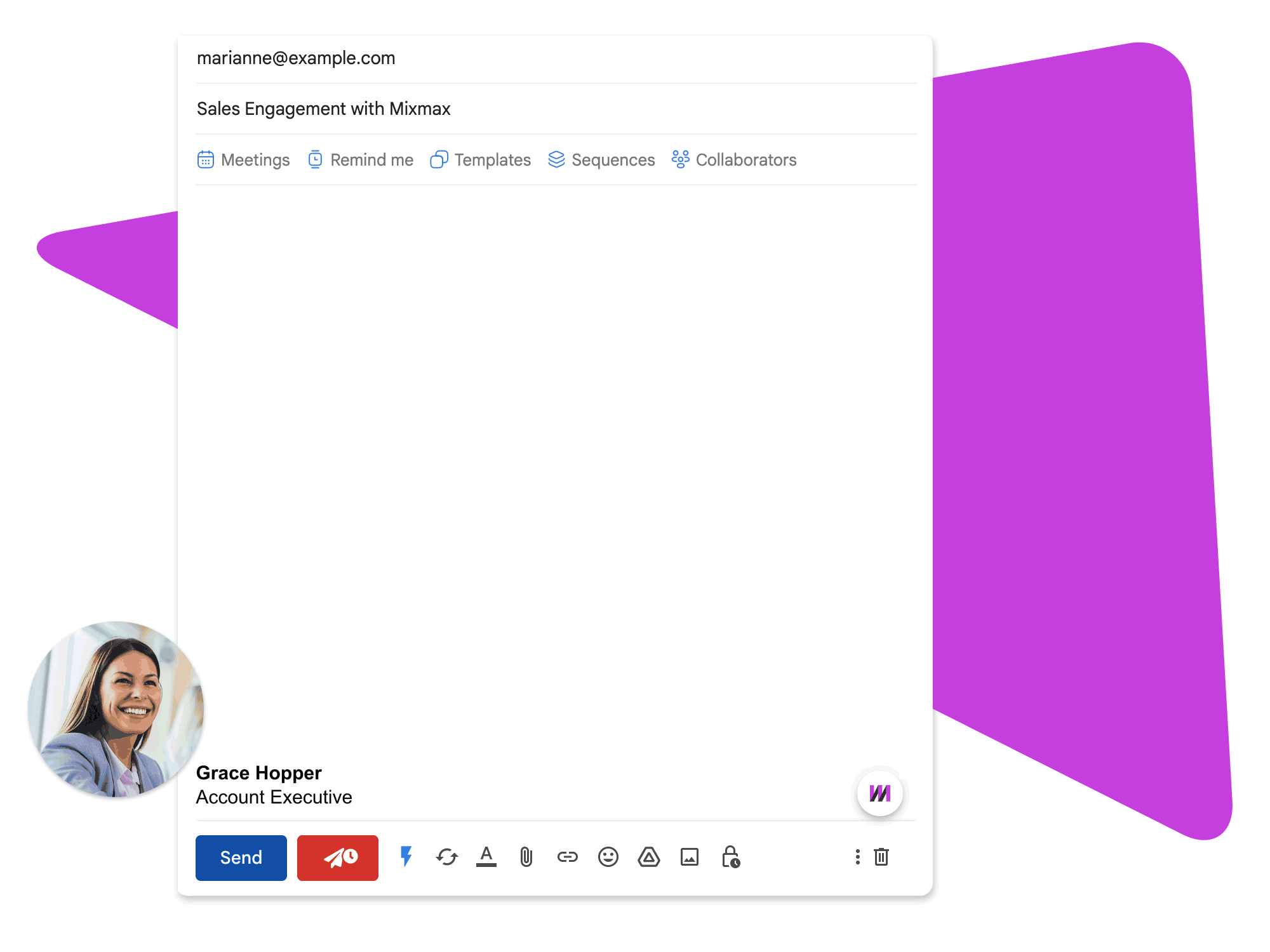July 5, 2023
46 Sales Discovery Questions That Help You Win Deals

- What are sales discovery questions?
- 46 Sales discovery questions to get prospects into the pipeline
- Rounding off
- Frequently asked questions about sales discovery questions
How often do you find yourself losing deals at the discovery stage?
In sales, asking the right sales discovery questions can make the difference between a closed deal and a missed opportunity.
By digging deeper into your prospect's challenges, key drivers, and goals, you can uncover valuable insights that position you as the solution they need.
Without being on the ball in discovery, you can have the world’s greatest product but lose your sale to an AE with better questions.
But in a rush to get to the demo, companies often skip this step altogether, which wastes precious time and resources. Not to mention prospects dropping out of the sales funnel because they were never truly a good fit.
Too many AEs make prospects sit through a call only to give them a vanilla demo that doesn’t specifically address their problems and pains.
We sell to salespeople, so we know all about how challenging discovery is.
We’ve talked to top salespeople to find out:
- What sales discovery questions really are
- 46 sales discovery questions to ask:
- Situational context discovery questions
- Dormant pain discovery questions
- Active pain discovery questions
- Measuring pain implications discovery questions
- Understanding the buying process discovery questions
- Evaluation stage discovery questions
- Decision stage discovery questions
- Wrap-up discovery questions
- Why BANT-style discovery questions don't work (anymore)
- Examples of BANT questions to AVOID 🚫
Ready to ramp up your discovery game? Let’s go.
What are sales discovery questions?
Sales discovery questions are targeted questions that help you better understand your prospect, their challenges, and whether they’re a good fit for your solution.
Asking great questions should be at the center of your sales discovery checklist.
During discovery and sales prospecting, there’s a lot you need to find out.
So how should you structure your sales discovery questions?
Your discovery questions should be open-ended to get your prospects talking. There’s little to discover about your prospect if they’re only answering ‘yes’ or ‘no’ questions.
| Related post: Sales Prospecting Questions to Get Your Prospects Talking |
Matching sales discovery questions to the appropriate stage of the buyer’s journey helps build rapport and confidence in you and your solution, so you can move steadily toward closing a deal.
By understanding your prospect and their pain points by asking the right questions, you’re building trust and forging a lasting relationship.
There’s lots to find out, but you need to make sure your prospect doesn’t feel interrogated.
 Source: UserGems' Krysten Conner, LinkedIn
Source: UserGems' Krysten Conner, LinkedIn
Choose from the following questions to help guide discovery—but don’t ask all of them.
And remember never to just read from a script. Use a balanced, flexible approach to discovery. Prepare and rehearse your questions, but leave enough room for the natural ebb and flow of the call.
Let’s explore some effective discovery questions to help you run a better sales discovery process.
46 Sales discovery questions to get prospects into the pipeline
Sales discovery is a crucial step in understanding how you can bring value to your prospects.
Being a successful salesperson means you genuinely care about what your prospects are dealing with. You’re there to help, and you’re endlessly curious about the ways you can help them best.
Preparing your discovery call questions helps you gather all the information you need to get aligned, excluding information you should’ve already gathered during the sales qualification stage.
If you’re using Mixmax, information gained from qualification will already be in your CRM and up to date, thanks to the two-way Mixmax-CRM activity sync.
We’ve listed several questions below for different stages in the discovery process. These will help guide your discovery to feel natural but make sure you get straight to what you need to know.
We're also including an interview with a sales influencer, Marcus A. Chan, who talks about his POWERFUL methodology when it comes to discovery:
Pro tip: To build rapport with your prospects, listen more than you talk (aka active listening)—we suggest an 80-20 ratio. And when you do talk, make sure it’s about them, not you.
Sales discovery questions to ask for situational context
Your prospects want to feel like you really get them.
By asking the right questions, you can show them they’re more than a buyer persona. Treat them as individuals with unique problems, to find out the specifics of their current situation and where it hurts.

Your main goal should be to uncover a potential fit between your solution and your prospect’s priorities.
This is your chance to empathize with them, validate their circumstances, and verify your previous assumptions and information you gathered in qualification.
Ask questions like:
1. Why did you decide to take this call?
This question gets right to understanding their motivations, and how ready they are to adopt or add a new solution.
2. Walk me through your current setup.
3. What do your current tools/products/solutions help you achieve?
These questions help define what’s lacking in their current situation and give you valuable information you can use to address their pain.
Sales discovery questions to ask for dormant pain
The fact that your prospect showed up to the call means there’s something bugging them, even if they don’t know exactly what.
Pain in this sense can mean anything from a minor annoyance to a key source of frustration for your prospect.
It’s your job to find out where it hurts, draw attention to it, and look for ways your solution can help.
Your questions should be focused on them, not you. The questions below help you fully dive into their dormant pain and bring it to the surface.
Ask questions like:
4. How much time do you spend doing {company-specific action} per day?
5. How effectively do you think that time is spent?
6. What would you change about your current solution?
7. What is the user feedback you get regarding your current solution?
8. On a scale of 1-10, how would you rate your current system? What would make it a 10?
These questions tell you about how they’re currently managing things—and most importantly, how it’s working out for them. That gives you a chance to see where your solution can bring value (maybe it saves them X hours on Y process they do every day).
Sales discovery questions to ask for active pain
Once you’ve unearthed your prospect’s pain points, it’s important to dig deeper and have them verbally address their pain, so they’re fully aware of their desire to solve the problem.
According to Kyle Parrish, “Great salespeople are problem finders as well as problem solvers. Without pain, there is no sale. Prospects do not buy ‘features’ of the product, they buy a solution to a problem that they have. If you can't associate your product or service to solving the pain of your customer, you leave it up to them to make the association—and that’s not a risk worth taking.”
By addressing their pain, you can tailor your solution to better address their needs. If prospects aren’t even aware of their problem, they’re not yet ready to look for a solution.
Ask questions like:
9. What kind of pain are you experiencing with your current solution or process?
10. How long has it been a problem?
11. What does it involve?
12. What does it look like/feel like for you?
13. What have you tried to do about that? How did it work?
14. How has this affected your ability to reach your goals?
15. What would happen if you do not make a change?
16. How would that impact your team/org and their ability to achieve goals?
These questions help pinpoint exactly what their pain is—and where it comes from—which helps you drive urgency for your prospect.
|
Pro tip: If you need to ask your prospect for clarification, use their language to reformulate what they’ve told you to demonstrate active listening to help build trust. For example, pay attention to their pacing, loudness, and sentence length and try to mirror it—and if your prospect uses industry jargon, try to incorporate it into your response. |
Sales discovery questions to ask to measure pain implications
Your prospect’s pain points need to be quantified to fully understand the implications of that pain.
Ask questions to put their pain in perspective, specifically looking to understand the price they pay in dealing with their challenges.
You should also make sure to ask about their bigger plans and goals for the year…and how their pain points are blocking them.
Ask questions like:
17. What are your pain points costing you?
18. What business outcomes (or KPIs) are you looking to drive this quarter/year?
19. How do your pain points deter them?
20. What potential roadblocks may keep you from achieving your top priorities, goals, and business outcomes?
Sales discovery questions to ask to understand the buying process
Understanding your prospect’s current buying process is the first step in gently directing them towards a better one.
Fully grasping their processes (their decision-making, buying, contracts, etc.) is very important—it’s the best way to shed light on how the process would potentially look like with your company and solution.
Buying process questions should communicate your genuine interest in their processes to understand potential opportunities where your solution could add value.
Ask questions like:
21. What is your current adoption? (if low adoption) why does low adoption matter to the company?
22. What do you think would change if the entire team fully adopted the solution?
23. Tell me about the process you went through when you bought _____?
24. What has slowed other products down?
These questions show you how quickly your prospects move through product adoption, and what to expect if they move forward with your solution.
Include some budget-specific questions, too.
Try asking:
25. How do you feel about the cost-to-value you currently perceive from your existing solution?
26. What do you pay your current provider?
These questions give you a sense of what their budget is, what they’re willing to pay, and whether they’re getting their money’s worth with the solution they’re using right now.
All of this background is gold for any AE looking to show prospects that your solution offers better cost-to-value.
If you find out your prospect doesn’t have a budget, don’t stop there. Go deeper to understand whether it’s possible to create one, and what that would look like.
Ask questions like:
27. Walk me through a situation when there’s been a tool you wanted but didn’t have the budget for—what did that look like?
28. How do we create budget? What needs to be seen/done?
.png?width=650&height=340&name=6%20Non-Boring%20Discovery%20Call%20Tactics%20(On-demand%20recording).png)
Sales discovery questions to ask for the evaluation stage
Once you’re on top of your prospect’s obstacles, processes, and desired outcomes, what’s next?
It’s time to ask questions to evaluate whether your prospect is fully confident that your solution will solve their problem. And if they’re not, you need to find out why not.
Questions include:
29. How often does your team start using new technology?
(^^This one's borrowed from UserGems' Krysten Conner)
30. Is this an active project internally? Where does it stand on your priority list?
31. Are you open to making a change if we show you something compelling?
32. What are your key evaluation criteria?
33. Who else are you evaluating? What do you like/dislike about the other solutions you have seen?
34. Who will implement this solution and what would they need to see?
Sales discovery questions to ask for the decision stage
During this stage of discovery, you need to find out the best next steps to take and understand who’s responsible for giving the go-ahead.
It’s super important to ask:
35. Who else would need to sign off on this?
36. What part of {your solution} do you think they will be most impressed with?
37. What part of {your solution} do you think they will be most hesitant about?
Sales discovery questions to wrap up
When wrapping up the call, ask specific, direct questions to see if your prospect is interested in moving forward with your demo.
If they’re showing signs of hesitation, address it. Asking them upfront can help build trust because it shows you’re not ‘wounded’ by their reluctance to move forward. This sends the message you’re not wrapped up in your own ego: you’re committed to taking the time to understand them and put their needs first.
Try asking these questions:
38. Assuming we finalize the pricing and financials—are you ready to move forward?
39. [If hesitation] what have we missed? What part aren’t you bought into?
40. Do you foresee anything that could mess this up?
41. What is the risk of saying yes?
42. How do we get from where we are today to a signed contract?
43. Do we need to talk to other departments?
44. Is this person aware you are bringing this contract to them?
45. What has this signer said to other products you have brought to them?
46. Have they ever shut down a product you wanted to buy? If yes, why?
Mixmax makes the discovery process a breeze. Use the in-email dialer and resource-sharing features to do all your discovery from one place.
This lets you focus 100% on your conversation and questions, without worrying about updating and jumping between different tabs.

Mixmax makes in-email calling super easy
Why BANT style discovery questions don't work (anymore)
BANT (Budget, Authority, Need, Timeline) has long been a traditional framework in sales discovery, but it has significant drawbacks when used in isolation or too early in the conversation. Here’s why relying solely on BANT can be detrimental:
- Too transactional, too soon: Jumping into questions about budget, authority, and timeline right off the bat can make the interaction feel transactional rather than consultative. It can give the impression that you're more interested in qualifying the prospect as a lead rather than genuinely understanding their needs.
- Overlooks the relationship-building aspect: BANT focuses heavily on qualifying criteria but neglects the importance of building rapport and trust. Modern buyers are looking for value and insight, not just a checklist approach.
- Ignores the nuance of buyer challenges: BANT questions often lack depth in understanding the prospect's unique challenges, pain points, and goals. They can lead to surface-level conversations that don’t uncover the real needs or urgency behind a prospect’s situation.
- Not aligned with the buyer’s journey: Prospects are often at different stages of their journey, and rigidly applying BANT can push them away if they aren't ready to discuss specifics like budget or decision-making authority.
Examples of BANT questions to avoid 🚫
- "Do you have a budget allocated for this solution?"
- Why it’s ineffective: Asking about budget too early can make prospects feel like they are being put on the spot. It also doesn't consider if they see value in your solution yet.
- Better alternative: "What are the challenges you're currently facing, and how are they impacting your business?"
- "Are you the decision-maker?"
- Why it’s ineffective: This can come off as disrespectful or dismissive, especially if the prospect is not the sole decision-maker but still has influence in the process.
- Better alternative: "Can you walk me through your decision-making process for selecting a solution like ours?"
- "When are you planning to make a purchase decision?"
- Why it’s ineffective: This question puts unnecessary pressure on the prospect and can make them feel rushed. It also doesn't take into account where they are in their buyer's journey or if they even see a need for a solution yet.
- Better alternative: "What is your current timeline for addressing the challenges we've discussed?" This allows the prospect to share their priorities and timing without feeling pressured.
- "How soon do you need to implement a solution?"
-
Why it’s ineffective: This question assumes urgency and may feel pushy, especially if the prospect is still in the early stages of exploring their options. It can also come off as more focused on your sales timeline rather than their needs.
-
Better alternative: "What impact would implementing a solution have on your current operations?" This invites the prospect to consider the benefits and creates a conversation around their needs without imposing a timeline.
-
-
"What’s your expected ROI from this investment?"
- Why it’s ineffective: This question can feel too direct and make the prospect uncomfortable, especially if they haven't yet fully explored or understood the value your solution can provide. It may also imply that the discussion is primarily about numbers, potentially detracting from building a relationship and understanding their needs.
-
- Better alternative: "What goals or outcomes are you hoping to achieve with a solution like ours?" This alternative opens up a conversation about the prospect's objectives and allows you to discuss how your solution can align with and support those goals, setting the stage for a more value-driven discussion.
Rounding off
Deals are won and lost in discovery.
You don’t want to lose another deal—or give your brand a bad rap—because of poor discovery.
Solid sales discovery questions can kick off a strong discovery process. But it’s not just about asking the right things: it’s about going outside your comfort zone to put the buyer at the center of all of your questions and concerns.

The best reps understand prospects’ problems and stay curious to find out how they can help.
They know you can’t skip this crucial step: you can’t pitch until you understand a prospect’s pain and you can’t understand a prospect’s pain until you’ve asked them.
Running a successful sales discovery process is a lot simpler when you're getting help from a reliable sales engagement platform.
Mixmax saves you time and headspace by automating repetitive tasks, keeping you on track, and asking the right questions, with email sequences and rules.
By asking the right questions, you've understood the prospect and gotten them intrigued enough to set up another meeting.
If you’re using Mixmax, you can also send an email with your availability and a one-click meeting-booking link to make scheduling your demo easy for everyone (no back & forth).
Don’t miss out on discovery by asking generic questions. Stay curious about how you can bring value, and use this guide and Mixmax to really focus on the call and get the most out of discovery.
Want more discovery calls that get results? Mixmax automates repetitive or manual tasks to give you back more customer-facing time. See how it works.
Frequently asked questions about sales discovery questions
How do you do sales discovery?
To do sales discovery, you need to ask targeted questions that help you dig deeper into the company and prospect, their challenges, key drivers, and how you might help them achieve their goals.
How do you ask a customer discovery questions?
To ask a customer discovery questions, follow these steps:
- Ask open-ended questions for in-depth insights (see our list of question for inspiration)
- Don’t read from a script
- Listen more than you talk
- Reiterate what your prospect says using their language
- Establish trust by understanding their pain
- Build a rapport and relationship with your prospect
What are discovery skills in sales?
Discovery skills in sales calls are skills that help salespeople understand their prospects better. Skills like active listening, attention to detail, time management, communication, and organizational skills are all important to put your prospect and their needs first.
How do you prepare for a discovery meeting?
To prepare for a discovery meeting, make sure to go over your questions and meeting agenda to help you feel more confident and make the most of the call. You’ll also need to become an expert in the common issues associated with your prospect’s role, what challenges their company might face, and their goals, so you can tailor your offering and demo accordingly.












